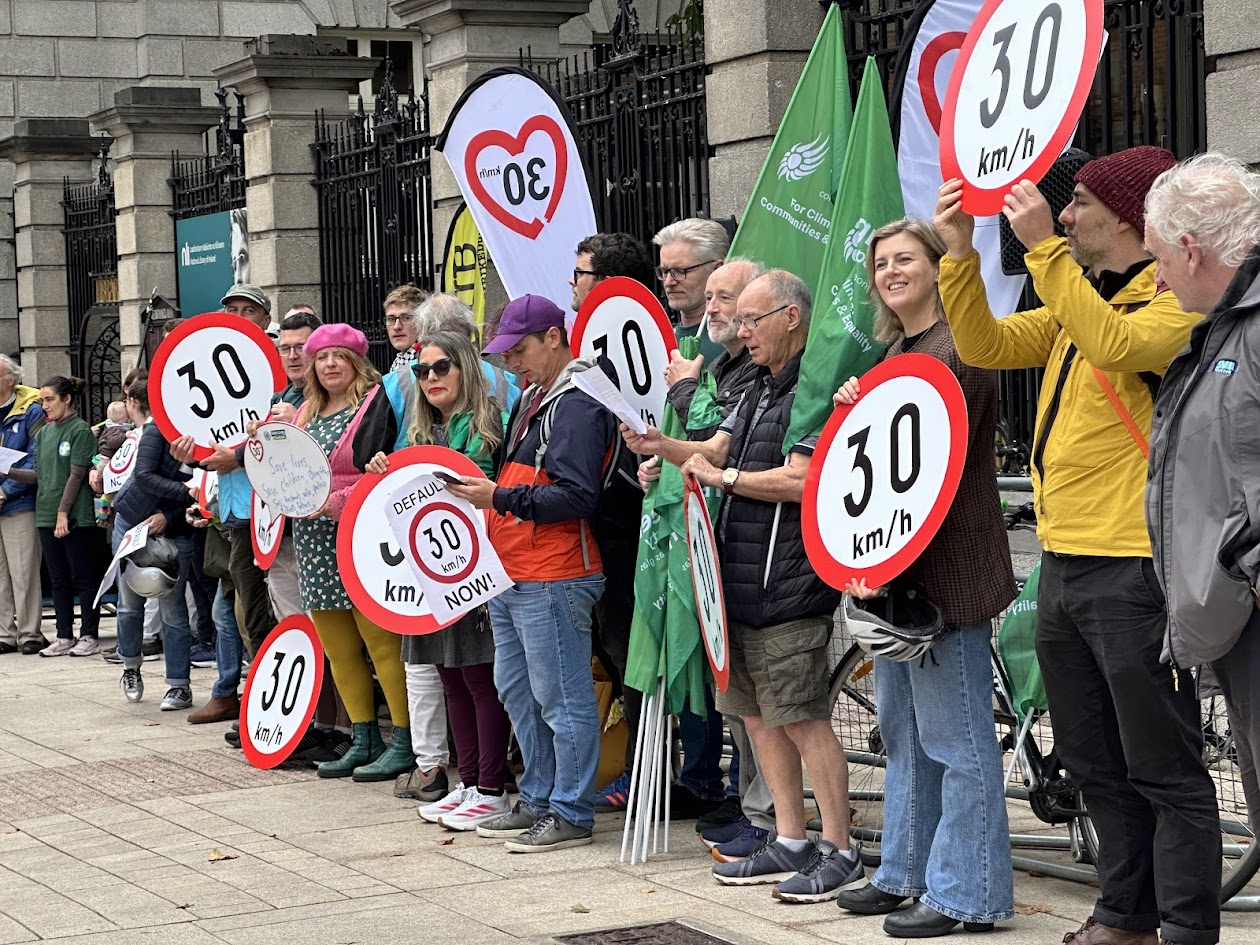
Delays to default 30 km/h rollout will cost lives
Love 30 and the Dublin Commuter Coalition made the case for a rapid rollout of the default 30 km/h speed limit at a presentation to Oireachtas members on 2 October 2025 and provided a briefing document to attendees. A rally by supporters of a default 30 km/h was aslo held outside Leinster House. As well as Love30 and the Dublin Commuter Coalition, this action was supported by Irish Doctors for the Environment, AccessForAll, Jesuit Centre for Faith and Justice, Kilcully Residents for Safer Roads, Ballyhooly Road and Summerhill North Residents for 30 km/h, Cycling Ireland, Irish Cycling Campaign, Connemara Greenway Alliance, An Taisce, Irish Road Victims Association, Wexford Bicycle Users Group, IBikeDublin, Bus Róthiachta na Gaillimhe, Coiste Slí Shábháilte, Cycling Without Age, Mór Action, and the Climate and Health Alliance.
At the presentation to Oireachtas members, a spokesperson for Minister Sean Canney, the minister of state with responsibility for road transport, said that the Department has instructed Local Authorities to use special speed limits to apply 30 km/h speed limits, rather than applying the default 30 km/h to all built-up areas as defined in the Road Traffic Act 2004. The Department also expects this process to take 18 months and only then will they be in a position to update the definition of built up areas. This means it will be three years, at best, from the time the legislation was passed to the implementation of the default urban speed limit to 30 km/h defined in the Road Traffic Act in April 2024. The spokesperson cited the outdated definition of built up areas based on the Local Government Act 2001 as a reason for the approach.
Love 30 is concerned at the delay in implementing the new default urban speed limit. Other countries, such as Wales have implemented nationwide reductions in urban speed limits in 14 months or less. Leaving it up to each Local Authority to decide which roads should have a 30 km/h speed limit on a road by road basis, is a laborious way to apply the new default, and will lead to inconsistencies between different local authorities. Local authorities already have the power to set 30 km/h speed limits on urban roads, yet requests from residents of busy roads for a 30 km/h have fallen on deaf ears. We recognise that the built-up areas have expanded and new built-up areas created since 2001, however this is not a reason to delay the implementation of 30 km/h in the currently defined built-up areas.
Many major cities such as London, Paris, Brussels, Milan, Helsinki and Zurich and countries such as Wales, Spain and the Netherlands have adopted a default urban speed limit of 30 km/h and have seen significant reductions in serious and fatal injuries.
Wales passed legislation setting a default speed limit of 20 mph (32 km/h) in July 2022 and fully implemented this across the whole country 14 months later (in September 2023). One year later they found significant drops in casualties and fatal injuries and the summer of 2024 was the safest since records began, including during the pandemic. In Spain a 30 km/h speed limit was introduced on all single-lane streets in September 2020. Since then, they have seen a 20% reduction in urban road deaths, and fatalities reduced by 34% for cyclists, 31% for the elderly, and 24% for pedestrians.
The delay in implementation of the 30 km/h default urban speed limit will lead to avoidable fatal and serious road injuries. We urge the minister to recommit to the timely implementation of the new default urban speed limit.
